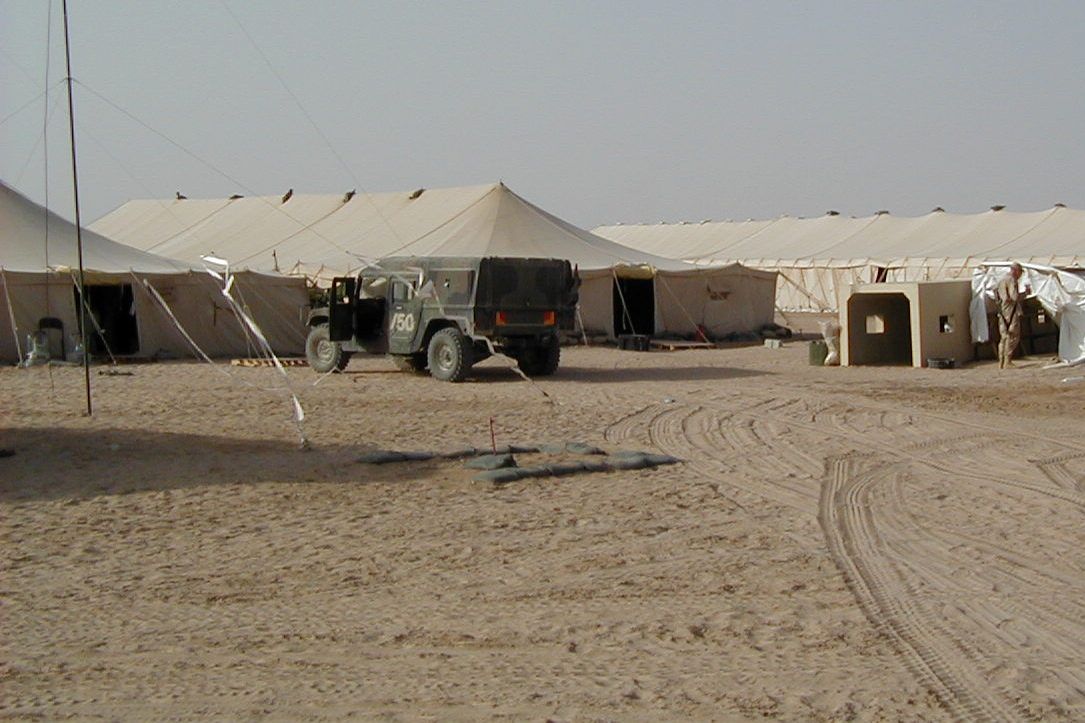Leadership Principle: You Can Delegate Authority But Not Responsibility
It's not easy to earn the trust of a "subordinate" who's almost twice your age. It's even harder to do it in a single day.

This article is part of a series on leadership.
Kuwait, May 2003.
It's Gonna Be a Hot One
"Sir, I don't think you should make the soldiers wear long sleeves."
It was a reasonable suggestion. The high in Kuwait that day was over 100 degrees. The high in Kansas when we left two weeks earlier was 70. None of us had adjusted yet to the harsh desert sun.
And if I'm being honest, I was more than happy to lose the long sleeves myself.
The Unusual Power Dynamics of Junior Officers and Senior NCOs
I had only met Sergeant First Class Kevin Taylor a few hours earlier.
I was 23; he was 37. I was a brand new second lieutenant; he had been in the Army almost 20 years. This was my first deployment; he had served during Operation Desert Storm.
Technically, I outranked him. But I was smart enough to know that didn't mean much.
The Task at Hand
It was the start of our deployment. We were moving vehicles from the port in Kuwait City to a staging area in the desert near the Iraq border.
Sergeant Taylor was the company motor sergeant. He was responsible for getting the vehicles running as they came off the ship. He would remain at the port for several more days until all the vehicles were offloaded.
I was a platoon leader. That day, I was responsible for leading a convoy of vehicles from the port to the staging area.
Sergeant Taylor briefed me on the condition of the vehicles prior to my departure. It was at this point that he offered me his friendly advice about altering the prescribed uniform.
I agreed with his reasoning:
- It was hot.
- We were still acclimating to the heat.
- It was hot.
- The soldiers would be driving for hours in vehicles with no air conditioning.
- It was hot.
- Kuwait was a friendly country so enemy contact was extremely unlikely.
- Did I mention it was hot?
I decided to take Sergeant Taylor's advice.
Convoy Briefing
Before any significant military operation, you hold a mission briefing to make sure everyone is on the same page.
I covered all the usual topics: the route, the travel speed, the catch-up speed, radio channels, contingency plans, etc. And then I got to play the hero.
"One last thing," I said before everyone headed off to their vehicles. "You can deblouse and wear your short-sleeve undershirts for the duration of the convoy."
Uproarious applause broke out as the soldiers whooped it up on the way to their vehicles. They had a newfound spring in their step.
I was quite pleased with myself.
Mission Complete
We arrived several hours later at the staging area with 58 of the 60 vehicles we left with (two were disabled shortly after leaving the port).
There were several other convoys that same day. Mine had the shortest travel time and arrived with the most vehicles. I'd love to take credit for that (I mean, I guess I just did), but it was mostly luck.
I got back to my tent after getting all the vehicles parked and secured. The other lieutenants in my company congratulated me for a job well done. It was one of my first big assignments, and I had knocked it out of the park.
Or so I thought.
"Colonel Gold wants to see us"
While I was still floating up on cloud nine, my company commander came by to bring me crashing back to earth. "Colonel Gold wants to see us," he said.
I could tell my company commander was nervous.
I wasn't sure what this was all about, but I knew it wasn't good. If you're not familiar with the military, let me assure you, it is highly unusual for a brigade commander to take a direct interest in the day-to-day life of a second lieutenant. As the leader of a 1,300-member unit, he has more important things to do.
And even if he did take an interest, I wouldn't expect him to talk directly to me about it. The chain of command goes both ways. Normally, he would say something to my battalion commander. Who would then say something to my company commander. Who would then deliver to me whatever message needed delivering.
Apparently, Colonel Gold didn't want to risk his message getting lost in translation.
What's the Worst He Could Do?
I had graduated West Point less than a year earlier. I had spent my entire plebe year getting chewed out. Whatever he had to say, I was sure I had heard it all before.
That's not to suggest that I didn't care. I just knew there were worse fates, like actual physical violence. We hadn't even entered the combat zone yet. There would be plenty of time to worry about physical violence later.
If there was one thing I learned at West Point, it's that physical violence against subordinates was no longer tolerated.
Wait, No One Can See Us Back Here...
That said, I still wasn't quite sure what to expect when I walked up to the brigade command tent. But what did happen caught me completely off guard.
Colonel Gold stormed out of the tent straight at us. He had all the cheer of a grizzly after a bad encounter with a porcupine. He shoved his two meaty tanker paws into the centers of our chests and clutched a fistful of each of our shirts. He than dragged us by said shirts behind the command tent, out of sight of the rest of the camp.
It was at this point that it finally dawned on me that Colonel Gold was not raised in the kinder, gentler Army with which I was so familiar. I half expected an old-fashioned beat down. He had the size and demeanor to pull it off, of that I had no doubt.
Yet, through all of this, I still wasn't really sure why I was there in the first place.
Who Runs This Brigade, Anyway?
"Lieutenant Wolfe," Gold bellowed. "Are you the brigade commander?"
"No, sir."
"Who is?"
"You are, sir."
"And what's the brigade uniform?"
"DCU's." (Desert Camouflage Uniform)
"With or without the long sleeve top?"
"With the long sleeve top, sir."
"I'm confused." He glowered at me. "I swear I saw an entire convoy of vehicles arrive earlier today and none of those soldiers were wearing their long sleeve tops. And yet each of those soldiers is in my brigade. Who told them that they could remove their long sleeve tops?"
"I did, sir."
The veins in his neck bulged like a garden hose about to burst.
"Why?"
I listed all my reasons. They sounded so logical earlier in the day.
"So," he hissed, "you've been in the Army for all of about ten minutes. And in all of your infinite wisdom you thought, 'Boy, that Colonel Gold, he's just an idiot. He must not know what he's talking about. I'm so much smarter than he is. I have so much more experience than he does. I'll just set a new brigade uniform policy.'
"I'll ask you again. Why did you change the uniform?"
You Can't Delegate Responsibility
At this point, it would have been very easy for me to say, "Well, ackshully, it was Sergeant Taylor's idea..."
It would have even been the truth. It would have also provided a defense for all the insinuation that my actions were merely the result of inexperience. After all, Sergeant Taylor had the experience that I lacked.
But–and here's the important part–Sergeant Taylor was not responsible for the convoy, I was. Changing the uniform was my call, not his. You can delegate authority, but you can't delegate responsibility.
So, when Colonel Gold pressed me for some other reason why I changed the uniform that day, I simply replied, "No excuse, sir."
Sergeant Taylor Returns From the Port
The rest of my "conversation" with Colonel Gold was decidedly one-sided (and an interesting story for another day–he turned out not to be the villain in the end). I took my (figurative) licks, did a few dozen pushups, and then returned back to my tent.
Sergeant Taylor returned from the port about a week later. He had heard what happened. He felt bad that his advice had gotten me into trouble. He couldn't understand, though, why he never heard about it from the command sergeant major or anyone else in the enlisted chain of command.
"Sir," he said to me, "why didn't you tell the brigade commander that it was my idea to change the uniform?"
"Because, Sergeant Taylor, you weren't the one in charge of the convoy. I was responsible. It was my decision."
He nodded pensively, then walked away.
Earned Respect
It's human nature to blame others for your mistakes. And because it's human nature, people do it all the time. So when someone takes responsibility for a mistake rather than passing the buck, the people expecting to receive the blame take notice. Sergeant Taylor took notice.
I earned Sergeant Taylor's respect that day.
Epilogue
Over the years, Sergeant T and I became quite close. During our first yearlong deployment, he and my platoon sergeant became good friends. We developed a mutual respect during our second yearlong deployment, when I got promoted to company executive officer which made me his direct supervisor.
He was a tremendous leader. He connected with his soldiers at a very deep level. He embodied the tough-love leadership style–delivered with equal parts toughness and love. He rose to the rank of first sergeant. I'm sure he made a tremendous "Top."
Sadly, Kevin Taylor passed away last year. The only thing he loved more than his Army family was his family at home: his wife Candy and their kids and grandkids. He was an inspiration to me as both a leader and a father.
We lost touch as we went our separate ways in the Army, but I was profoundly sad to read of his passing. I'm getting choked up writing about it again now, so to cheer me up, I'll leave you with this picture of Sergeant T at the wash rack in Kuwait.

I'll never forget that mischievous grin. I miss you, Sergeant T.
Further reading

Image by Mike Wolfe, somewhere in the deserts of Kuwait, May 2003.
UPDATE [2022-11-11]: Added link to article on leadership principles at the top of the page.

